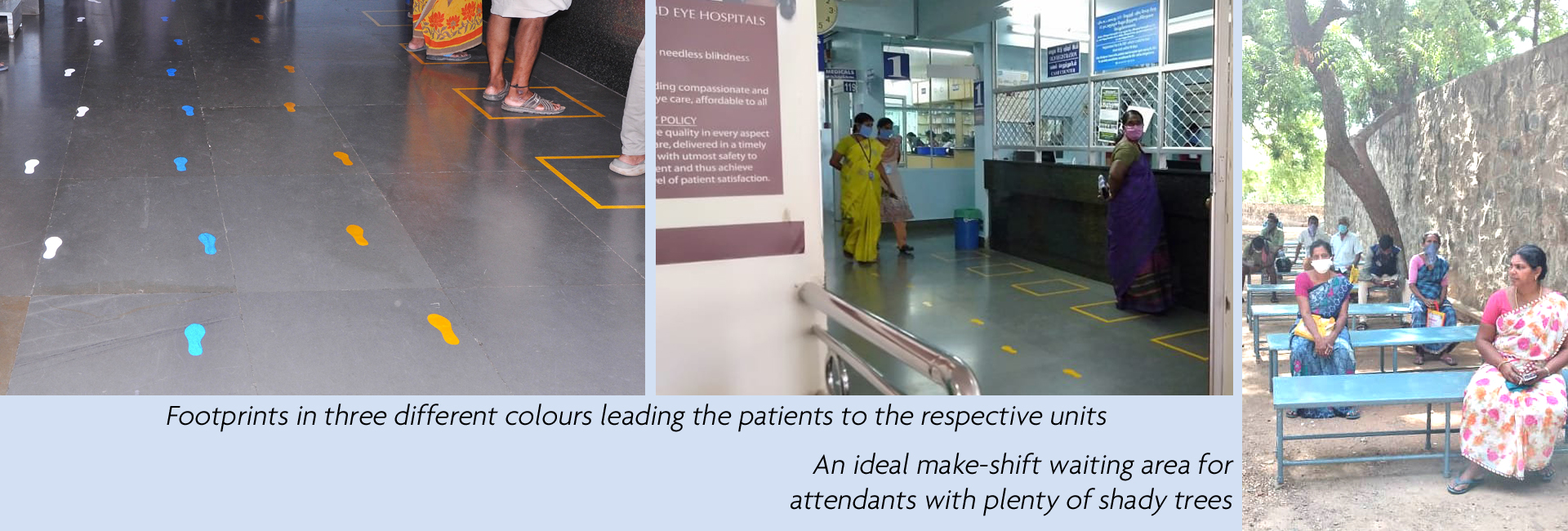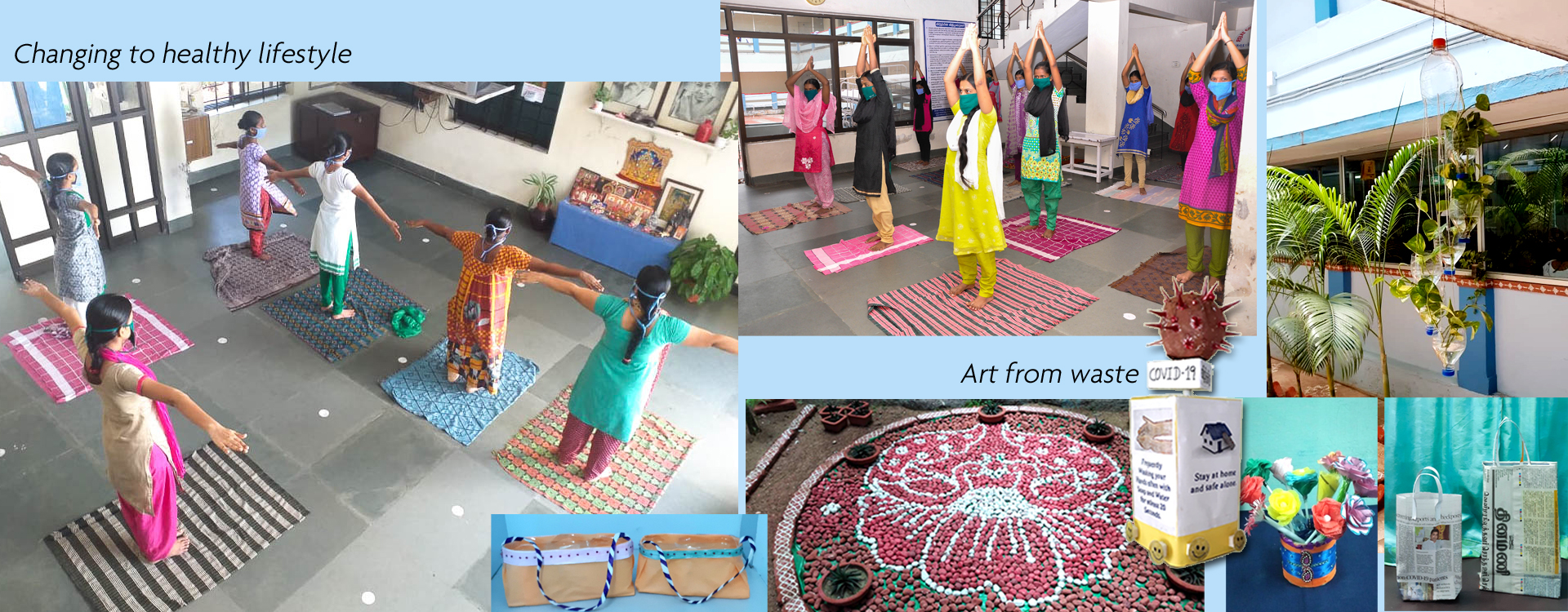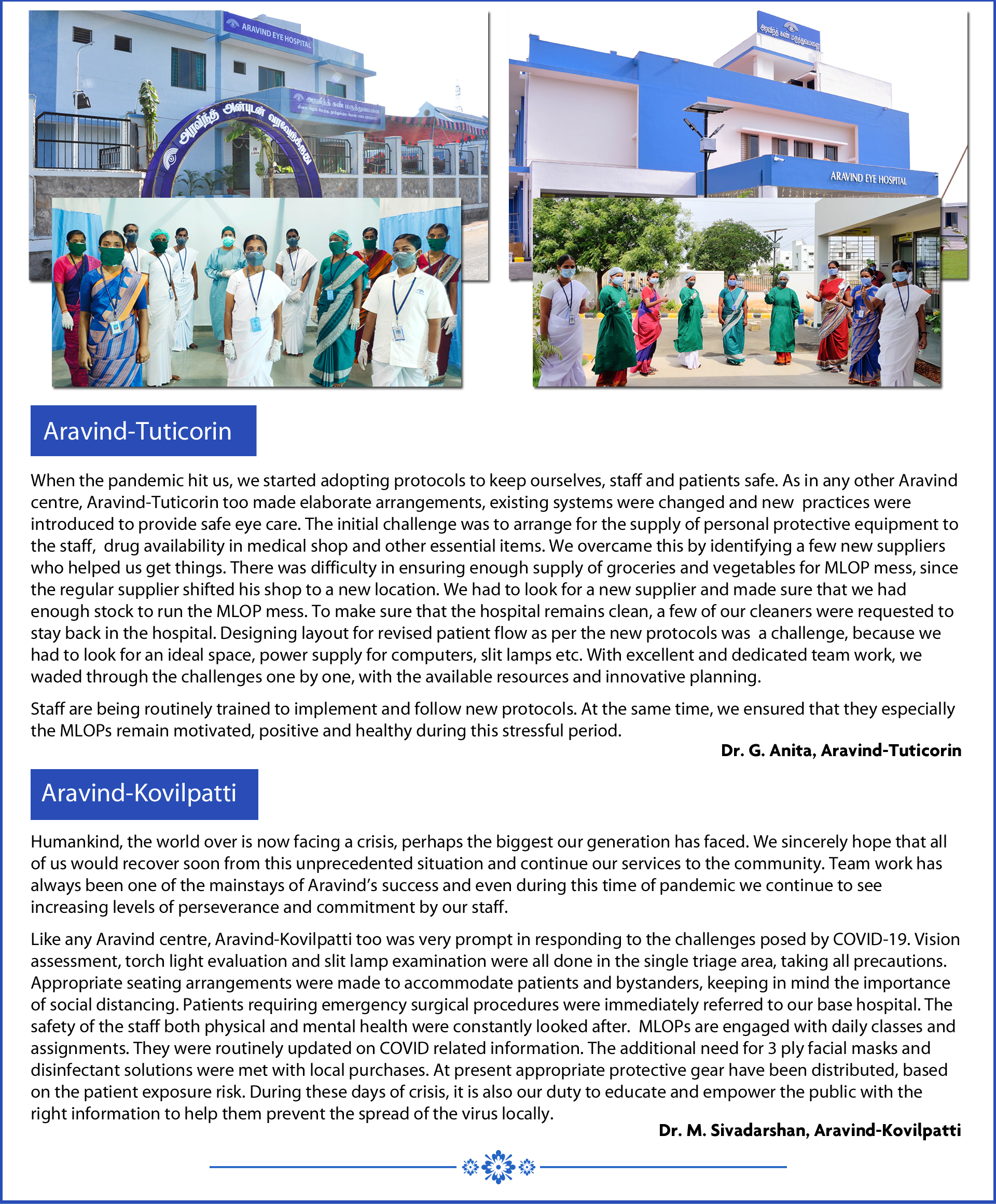Lock down activities at Aravind-Tirunelveli
Facing crisis especially when there is no such precedence is a real challenge. Let’s hear from Aravind-Tirunelveli, how it swiftly responded to the need of the hour and prepared itself with available resources.
The lock down though was extremely new to all of us, by proper planning, we learnt to tackle the situation and also utilize the time effectively. It has taught us many lessons. Once the lockdown was announced, we immediately recognised the challenges in front of us. Without wasting time, all of us including our secondary centres in Tuticorin and Kovilpatti sprang into action and quickly prepared ourselves with available resources.
We are happy to share with you theme assures undertaken during these critical days, apart from the standard safety protocol that is followed across all Aravind Eye Hospitals.This ensured continuing our services in the best possible way, at the same time making sure that the staff as well as patients remain safe. This is only the tip of the ice berg, where the efforts put in have shown tangible results or the outcomes are measurable. More efforts are being made to come out with lot more changes, in the event of resuming to the normal inflow of patients these days.
We take this opportunity to express our heartfelt gratitude to the SLT Members and the Chairman for their consistent support and guidance during this crucial period. We would also like to thank Aurolab for providing us with the necessary personal protective gear in a swift manner.
– Dr.R.Meenakshi and team
Adapt to change
COVID-19 pandemic has thrown lots of challenges. To address some of these, on the infrastructure level, several modifications were made.
Acting upon an idea given by Dr. R. Venkatesh of Pondicherry, at the Registration counter, footprints in three different colours are marked and the patients are instructed to follow these to reach the respective units. This eliminates the need for escorting, especially during these days when social distancing has to be strictly followed. This has helped reduce patient waiting time and crowding as they no longer need to wait for the sisters to guide them.
Lack of adequate waiting area has always been an issue. With no attendant’s policy now, attendants cannot be asked to wait in the scorching sun. Necessary arrangements are being made at the entrance of the hospital to increase the waiting area. Patients’ car parking area with some modifications also promises an ideal waiting area with plenty of shady trees around.
Another major happening was the implementation of Electronic Medical Records (EMR). Electricians and the IT department worked with great enthusiasm throughout the lock down period and EMR has been running smooth in the Free section since April 10, 2020. These lean days provided the best opportunity to train staff in the use of EMR.
Patients normally go back to the respective clinics for counselling after they get medicines from the pharmacy. Following in the footsteps of Aravind-Pondicherry, Aravind-Tirunelveli has now posted an MLOP near the pharmacy whose sole responsibility is to give counselling. This way, the patients do not have to go back to the clinics again.Due to lack of space for maintaining social distancing in Pharmacy, an additional counter is opened in the basement to cater to the needs of specialty patients.
Painting of adjustable tables, slit lamp base, operating microscope base, in-patient care area etc is usually done during the festival season when the OP load is less. This year, because of incessant rains, this couldn’t be done. Lock down and the resultant lean days provided adequate opportunity for carrying out all these pending maintenance tasks.
Uninterrupted care despite challenges
Patients continued to receive care, though majority of the cases were related to emergency conditions. Utmost care was taken to ensure that the necessary safety protocols and of standard operating procedures are in place for both patients and staff. Team continued Retinopathy of Prematurity screening at Government Medical College Hospitals. There were some constraints in the beginning especially when the team had to cross district borders. The issue was sorted out with approval from the Sub-Collector. The team has evaluated, done Lasers and injections for 4 Pre-term babies during this period who could have otherwise lost vision forever. It was truly a moment of satisfaction for the team, doing their best in the prevention of needless blindness, despite many challenges.
For the convenience of the patients, the hospital initially introduced tele-consultation. Since the response was not so encouraging, Whatsapp consultation is being tried which has gone really well with the patients. The response is encouraging and till now nearly 300 queries of patients have been addressed and suitable treatment suggested.
Learning and sharing knowledge in times of crisis
Aravind-Tirunelveli for the first time ever conducted an online CME. Titled, Update on Ophthalmic Imaging, the CME was originally scheduled for March 22, 2020. Due to COVID-19 threat, it was postponed and later on, the team decided to offer it online via Zoom and YouTube live stream. Dr. Suzanne Gilbert of Seva Foundation shared the details of CME with Seva’s partner hospitals in Nepal. Aravind’s alumni both national and international too were intimated. The response was overwhelming. Spread over a period of four days from April 20-23, the CME had nearly 900 participants.
With routine patient care services suspended, doctors now have the much-needed time to pursue their long-pending academic interests. They are being encouraged to fruitfully utilise the time writing papers for various journals. 34 papers have been submitted so far during this lock down.
MLOPs too have come up with many articles to be published in Aravind’s in-house journals namely Kannoli and Compassion. Around 35 articles are ready by now.
MLOPs and their changing lifestyle
As in other centres, adequate care was taken to ensure that the MLOPs remain safe by strictly following all the hygienic measures. It was challenging in the initial days to make them understand the importance of maintaining social distancing and proper use of masks. With repeated instructions and constant monitoring, they too fell in line and have started to live with the lifestyle changes that the situation demands. A lot of developmental initiatives have been undertaken towards ensuring their holistic development, Regular academic session consists of speciality lectures, assignments and project works. Some of them even attended online sessions arranged by Essilor and Zeiss. Games and Yoga sessions help them remain active, keep their minds alert and improve concentration.
The lock down as in the case of every one has been a time of unleashing hidden talents. MLOPs excelled in creative experiments, making use of old and discarded items and coming up with beautiful products.
Innovations for a cause
Virus surviving on inanimate objects like paper etc is always a matter of concern. There have been many instances of people leaving newspapers or vegetables in the sun for a few hours in an effort to kill the virus. Though the Government of India tries to promote digital money, a great majority still prefer to use cash especially the illiterate. How to handle cash in these days of COVID-19 threat was something that bothered everyone.
The spark for an idea came from Dr Datta of Aravind, Theni who shared his experience of a vegetable vendor asking him to put cash in a box and not handling it directly. Based on that, at Aravind-Tirunelveli, the team kept a plastic box into which patients are asked to drop cash. At the end of the day, cash collected in these plastic boxes is counted and stored in a container overnight along with a formalin soaked eye pad to prevent the spread of virus, if any. Cash is handed over to the bank on the next day. Formalin tablets have been given to vision centres to be put inside the cash collection box to follow the same practice.
With the hospital receiving lots of packages by courier, it has become imperative that these are decontaminated before use. Towards this, a dedicated room with UV light is set up. The packages are handled with gloves and kept in this room overnight for decontamination. The room is also used to decontaminate used masks.
Another small step taken towards staff safety is devising a temporary hood covered with plastic sheet to be used in post-operative care area. Usually, after general anesthesia, patients especially children cough frequently in the immediate post-operative recovery. The hood with the plastic sheet when placed over the patient prevents the spread of aerosol particles while coughing. Sheets used here are the ones that come along with the phaco cassettes which are then resized to fit on the hood.
Hospital cleanliness is of utmost importance and more so now. For the safety of housekeeping and sanitary staff, a cost effective protective gown was made using clear garbage bags. The cost per piece is Rs. 15/-. These can be reused after washing with soap water or even can be disposed.
The blue plastic table drape is also converted into a PPE as shown in the picture. Though this does not give full protection, it covers most of the front area and any splashes of blood can be easily wiped clean. The total cost of this is just Rs.60/-
During Investigations like Fundus Photo, OCT and such other examination procedures, a plastic sheet fit in between the technician and patient helps prevent close contact thus reducing the risk of exposure and infection
Most of the doors are left open but in some areas where AC to be used and temperature maintained, the doors will have to be kept closed. In such areas to open the door, tissue papers are kept handy to use the handle and the used paper can be disposed. This is in addition to cleaning the handles with Lysol every hour.
In some areas, to open the doors without touching the handle, a metal piece is fixed horizontally at the bottom which can be operated with foot.
- Simple foot-operated hand sanitizer dispenser eliminates the need for hand-touch and thus causing the spread of infection.It is a very cost-effective option and the total cost is around Rs. 560/-
- A simple device to hold the lens (90D) to enable the doctors to examine patients from a distance has been developed. A rubber covering for the 20D lens is also developed and used so that cleaning is made easy.


















